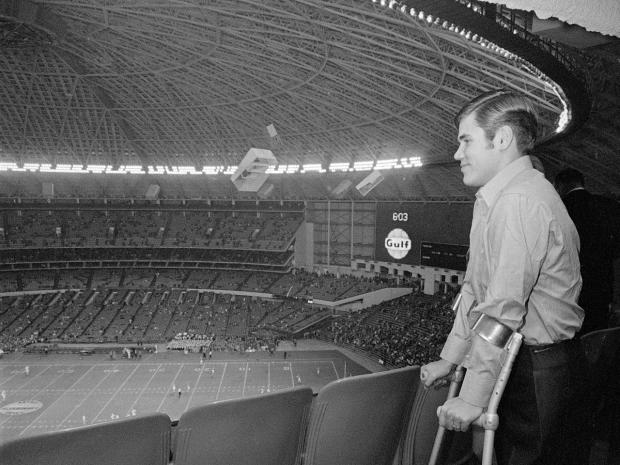"My All American" captures legendary cancer-fighting football player's spirit
Angelo Pizzo, the writer of famous sports movies "Rudy" and "Hoosiers," is making his directorial debut in a new movie about the college football player who inspired the war on cancer which led to the National Cancer Act.
Called "My All American," the movie centers on Freddie Steinmark, who was small statured yet described as having gritty skill and unyielding faith while playing for the University of Texas, reports CBS News' Mark Albert for "CBS This Morning: Saturday."
Overlooked as a high school running back, Freddie took the national spotlight in what was dubbed the game of the century between Texas and Arkansas. The game garnered so much national interest that it was even attended by then President Richard Nixon.
There was no sign at the time that the 20-year-old player who steered the Longhorns would never play again.
Shortly after that game, Freddie went to see a doctor about searing pain in his left leg, and he was diagnosed with cancer. The malignant tumor was so aggressive that doctors amputated his leg less than a week later.
Doctors gave him less than six months to live but told Freddie he could die in as quickly as two months as the aggressive cancer spread.
Freddie, known to friends and family as a fighter, defied everyone's expectations as he battled the cancer for 18 months, but he didn't just battle his own cancer; he became an advocate for cancer research and a national symbol.
His battle became so publicized that his death on June 7, 1971, was announced by Coast to Coast radio host Howard Cosell, who said, "There is a sadness overwhelming the youngsters at the University of Texas. And I suspect there is a great sadness everywhere in the country today among sports lovers. Cancer took Freddie Steinmark yesterday. In a sense, he is representative of the very finest qualities that sport can bring to human society."
In the months that followed Freddie's death, the nation's grief turned to determination, and Richard Nixon declared war on cancer. A short time later, Congress passed the National Cancer Act, marking the largest efforts the U.S. had made to fight cancer at the time.
Though Freddie could not play in the Longhorns' championship game, he did make it to the field just three weeks after his leg was amputated, and he watched as his team completed an undefeated season by winning the national championship.
Friend and high school teammate Bower Yousse, who wrote "Freddie Steinmark: Faith, Family, Football," the first authorized biography of Freddie Steinmark, told Albert that in the locker room after the championship game, coach Darrel Royal gave him the game ball.
"He was 150 pounds of heart," Yousse said of Freddie.
"You knew he was one of the best on the field," said Freddie's younger brother, Sammy Steinmark.
Freddie's Longhorns claim four national championships, two Heisman Trophy winners and 69 Olympic medalists, but it's to Freddie that the University of Texas football players pay tribute to before every game in Austin.
They tap a statue of him as they pass on their way to every home game as a way to dedicate themselves to the courage Freddie showed in the face of the longest odds.
"Something in Freddie touched me very deeply. And if it touched me very deeply, I thought there was an opportunity to touch others," said Pizzo, describing why he chose Freddie's story to make his directorial debut.
"He was driven to achieve and driven to succeed at everything that he tried. But it wasn't by ego. And it wasn't by ambition. There was a selflessness and a humility to him that made me feel like he was almost a Western hero. He was like John Wayne," Pizzo told Albert.
Incredibly, just two months before his death, Freddie finished an autobiography called "I Play to Win."
He wrote, "I wish this impossibility: that all cancer patients ... could have the morale boost given me by all of the well-wishers."
"I don't know anybody like Freddie," said Pizzo.
The movie, "My All American," is in theaters now.
